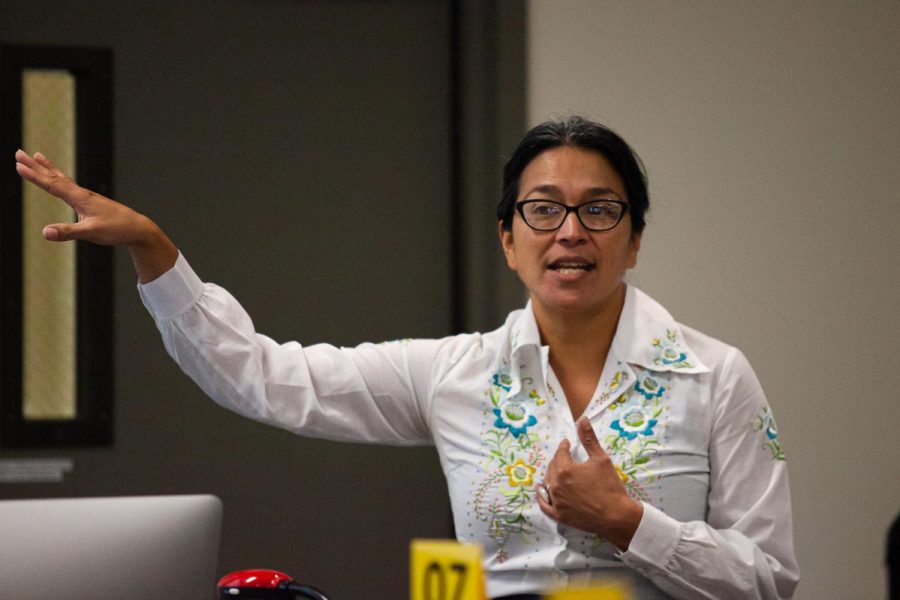Melissa Menendez held back tears as she read her letter of resignation during the Jan. 22 Academic Senate Meeting. She was conflicted, speaking out against the decision-making process and leadership of an institution she loves.
City College is at a crossroads.
Declining enrollment had led to mass class cancellations, and growing tensions between administration and staff, as highlighted in the recent campus climate survey, are symptoms of a larger problem that is not being addressed.
“We can only do better for our students if we actually collaborate,” said Menendez. “We can agree to disagree.”
The Strategic Enrollment Management Committee was created as a way for the college to keep up with constantly changing enrollment trends and make sure its programs and services are meeting the needs of the students coming in.
This includes making decisions regarding “recruitment, enrollment, retention and goal completion,” according to its website.
And with 105 course sections canceled this January, compared to only seven in January during Spring 2019, it’s becoming clear the college is struggling to stay in touch with its students needs.
Menendez withdrew from the committee in January and read her letter during public comment at Academic Senate, “in hopes that it inspires dialogue” that will lead to changes in the shared governance process City College.
“There needs to be more dialogue between groups,” said Menendez. “The layers of the problem are not being acknowledged.”
Menendez, who has been at City College since 2006, has been heavily involved in shared governance on campus, serving two terms in the Academic Senate. She also serves as an advisor for the Associated Student Government.
Her involvement centers around her desire to give voice to those that are often unheard, she said, in decisions that affect them the most.
“The campus as a whole, they need to listen to those that feel marginalized,” Menendez said.
Tina Kistler, the intercultural communication course director who has been at City College since 1999, also recently resigned from the committee. She has not been as outspoken as to why she decided to leave, but stands in support of Menendez.
When she was appointed as one of the five faculty on the committee, she was excited to have a part in the direction of the school.
“This campus is innovative, progressive, we have an entrepreneurial spirit,” said Kistler. “It was an opportunity to lend my voice.”
But over the past two years, according to recent surveys, the college has had trouble dealing issues revolving around equity, diversity, and inclusion.
“It doesn’t feel as innovative,” Kistler said.
For both Menendez and Kistler, the time spent discussing decisions did not reflect their weight. At the Dec. 10 meeting highlighted in her letter, Menendez says that an agenda item regarding the creation of workgroups in the committee was decided after only eight minutes of discussion in which many members’ concerns were not fully heard.
Menendez was worried this would separate the committee into smaller subgroups to make decisions, which would take away from a collaborative group discussion with all members involved. After raising these concerns, she felt that they were not given proper time to consider before voting on the item. Menendez was the only member to vote against.
“We’re not giving real time to issues,” said Kistler.
“You feel like you’re dismissed,” said Menendez. “This needs to shift. That power dynamic needs to shift.”
Since speaking out, others have come forward in support of Menendez. At last week’s College Planning Council meeting, Psychology Professor Stan Bursten read a letter of support that was signed by 53 faculty and staff.
Now that the issues are on the table, and leadership is fully aware of the problems, City College must decide which steps to take moving forward.
“Is the administration ready to come to the table? Really think of how to do things differently?” Menendez asked.
Academic Senate will appoint replacements for Kistler and Menendez on the committee at the Feb. 12 meeting, and time will tell if leadership will make a change.
“We don’t have a choice. We have to. There’s too much at stake for the students,” said Kistler. “We’ve got to figure it out. We need common ground, common language. There’s ways to do it.”














